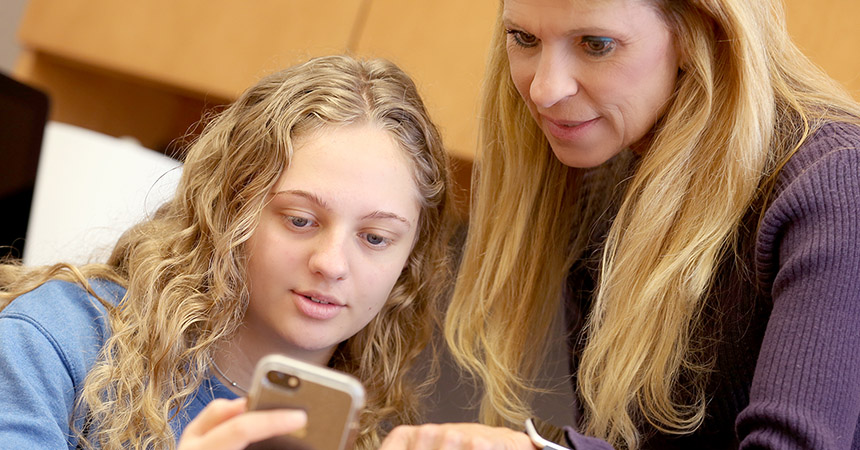Helping teens judge the legitimacy of health information online
By Jan Jarvis
Ryleigh Hajek turned to the Internet when she woke up one morning with severe back pain.
But the 18-year-old didn’t rely on random websites or blogs to diagnose her symptoms.
She knew better.
“I only reviewed legitimate websites, and they all pointed to an ovarian cyst,” she said. “It turned out that’s what I had.”
At a time when most teens turn to Dr. Google for answers about everything from flu symptoms to pregnancy, Hajek is an exception. After participating in an interactive program called WebLitLegit, she knows how to find accurate health information on websites such as MedLinePlus.
WebLitLegit was created by an interprofessional team that includes UNT Health Science Center to improve the health literacy of teens and teach them how to access, understand, appraise and apply health information, said Teresa Wagner, DrPh, Assistant Professor, Department of Lifestyle Health Sciences and Clinical Executive for SaferCare Texas.
In partnership with Carol Howe, PhD, RN, Assistant Professor of Nursing at Texas Christian University; Brennan Lewis, DNP, APRN, Director, Patient Education & Engagement, Children’s Health Dallas; and Tracy Adams, BSN, RN, Director for Research & Clinical Innovation, Medical City Dallas Medical City Children’s Hospital, WebLitLegit was designed to help teens evaluate health truth versus trash.
“The idea is to educate teens about how to discern credible information from non-creditable,” Dr. Wagner said.
For the majority of teens, making that distinction is no easy task.
An estimated 70 percent of youths use the Internet as their first source for health information, according to a 2016 study. At their age, many lack the knowledge and skills to filter reliable from unreliable health information, Dr. Wagner said. Finding health topics on the Internet can be challenging because searches return large volumes of information, making it more difficult to recognize what is reputable.
Distinguishing current from outdated data is one of the big challenges teens face, said Dr. Charleen Handzel, clinical rotations teacher at Dallas Jackson Career Center in Lewisville.
“If something was written in 2003, it might not be valid today,” she said. “But teens often overlook how old information is or question if it is valid today.”
During the workshop, teens learn how to recognize science-based information from opinion, identify credible sources, question why the information is being presented and analyze if it sounds too good to be true.
Teens in the workshop said they have searched online for information about migraines, fever, concussions, flu and other health topics.
Many teens get health information from Wikipedia, blogs and other sources instead of finding legitimate medical websites, said Regan Vehrs, 17, and a workshop participant. “Knowing where to look has helped me a lot, not just with medical stuff but research too,” she said.
The video used during the workshop was created with the help of teens from Dr. Handzel’s Class, the Boys and Girls Club and Cook Children’s Youth Advisory Council and was designed to be offered in social settings that appeal to that age group.
Youth volunteers who take the workshop are then trained to teach what they have learned to other students, Dr. Handzel said.
The hope is that when teens have health-related concerns, they will be better equipped to evaluate websites and get the help they need, Dr. Wagner said.
“By increasing their knowledge and competency, they’re better able to make informed decisions about their health,” she said. “This tenant of Healthy People 2020 ultimately impacts their ability to prevent disease and to stay healthy and well.”
Hajek said her friends turn to her for help researching their symptoms.
“It’s not a good idea to just Google and click the first site,” she said. “It definitely helps to know which websites to look at when you’re trying to decide if you should go to the doctor.”




![Uyen Sa Nguyen Scaled[58]](https://www.unthsc.edu/newsroom/wp-content/uploads/sites/16/Uyen-Sa-Nguyen-scaled58-145x175.jpg)

Social media